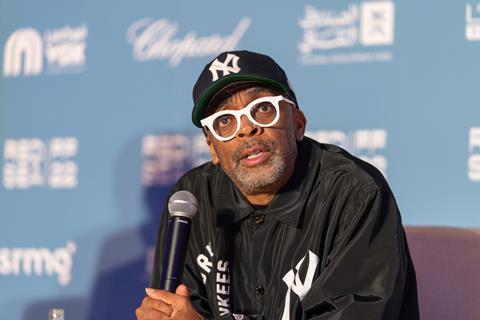
The growth potential of the film industry in Saudi Arabia was clear to see for international attendees at this year’s Red Sea International Film Festival (RSIFF), which closed on December 9.
The event itself was well organised, well attended and, above all, well-funded. A procession of stars flew in, including Antonio Banderas, Jackie Chan, Shah Rukh Khan, Spike Lee and Sharon Stone. Bruno Mars performed live at the opening party, one of many lavish galas. Cars ferried guests between their hotels, the Ritz-Carlton festival hub and the main screening venue, a 25-minute (often hair-raising) drive to the Vox Cinema multiplex in the Red Sea Mall. Guests were even provided with a per diem to spend on food and drink.
The Ritz-Carlton was home to the Red Sea Souk, the festival’s market. Two halls housed booths for firms including Saudi production company Telfaz11 and exhibitor Vox Cinemas, and locations such as AlUla and Neom. Also represented were organisations including the Saudi Film Commission and the Cultural Development Fund. Netflix had a space showcasing women filmmakers from the Arab world. Other rooms housed Red Sea Immersive, the festival’s VR programme, as well as its project market, new talent initiatives and conference sessions.
Most business — from networking and deal-making — took place away from the booths in a huge central hall at the Ritz-Carlton, which buzzed with activity. The hotel’s garden area became a networking hub once the sun lowered in the afternoon.
International attendees remarked on the welcome. Danny Perkins, CEO of Elysian Film Group, said the festival had been “incredibly well run by a very pleasant and welcoming young staff”.
There was plenty of security around the Ritz-Carlton (the road leading to and from the hotel was open only to festival traffic), but otherwise Jeddah felt safe and open to international guests. There was also a more liberal, creative and energetic atmosphere than some attendees expected, a result of the reforms that have swept Saudi Arabia in recent years.
Above all, visitors could sense real growth potential in Saudi Arabia, which only lifted its decades-long ban on cinema in 2017. Cinemas have been built rapidly, making Saudi Arabia the only country where box office has more than doubled since the Covid-19 pandemic; by 2030 box-office revenues are predicted to surpass $1bn — putting it in the top 20 of global cinema markets.
In a keynote speech, Wild Bunch International co-founder Vincent Maraval drew comparisons between the growth rates of the Saudi and Chinese film industries. “When I started working, 25-30 years ago, the Middle East was basically [only] Lebanon,” he said. “Today, that has all changed.”
He added that the most exciting aspect of the growth in Saudi and other developing markets is the age of the audience. “In Europe, the cinema audience is getting older. It’s like we lost the young generation to the streamers,” he said. “But here, or in Southeast Asia, Latin America or Africa, it is the young generation that goes more and more to the cinema.”
Gianluca Chakra, CEO of pan-Arab distributor Front Row Filmed Entertainment, praised the selection of films at Red Sea, a few of which he said subtly pushed boundaries for the region. However, he called for “clear and true interactions” between the festival and the country’s censorship authorities to guarantee a nationwide release for films screened at the festival. “We distributors and producers alike need a true launchpad for our movies and RSIFF should/could become a true Middle East and North Africa (MENA) launchpad for foreign and local movies.”
Perkins said it had been invaluable to visit the region and see the appetite and enthusiasm for cinema: “The region is truly changing at a pace through production, distribution and exhibition.”
Chakra added that he had been impressed by how the MENA filmmaking community came together at the Red Sea Souk to promote dialogue. “It’s a learning curve for the whole MENA [region], and particularly Saudi, which is trying hard to take advantage of the immense opportunity they have been given. It’s their time and we all need to make the best of it.”
























No comments yet